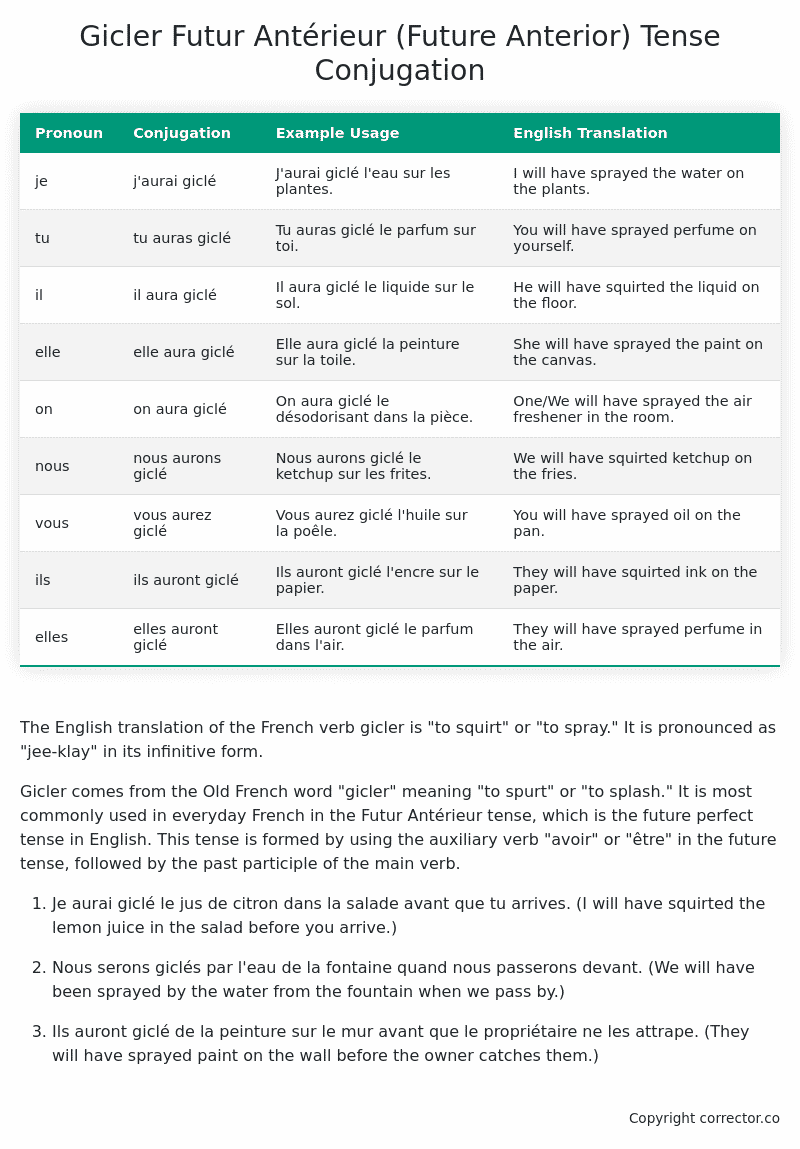Futur Antérieur (Future Anterior) Tense Conjugation of the French Verb gicler
Introduction to the verb gicler
The English translation of the French verb gicler is “to squirt” or “to spray.” It is pronounced as “jee-klay” in its infinitive form.
Gicler comes from the Old French word “gicler” meaning “to spurt” or “to splash.” It is most commonly used in everyday French in the Futur Antérieur tense, which is the future perfect tense in English. This tense is formed by using the auxiliary verb “avoir” or “être” in the future tense, followed by the past participle of the main verb.
-
Je aurai giclé le jus de citron dans la salade avant que tu arrives.
(I will have squirted the lemon juice in the salad before you arrive.) -
Nous serons giclés par l’eau de la fontaine quand nous passerons devant.
(We will have been sprayed by the water from the fountain when we pass by.) -
Ils auront giclé de la peinture sur le mur avant que le propriétaire ne les attrape.
(They will have sprayed paint on the wall before the owner catches them.)
Table of the Futur Antérieur (Future Anterior) Tense Conjugation of gicler
| Pronoun | Conjugation | Example Usage | English Translation |
|---|---|---|---|
| je | j’aurai giclé | J’aurai giclé l’eau sur les plantes. | I will have sprayed the water on the plants. |
| tu | tu auras giclé | Tu auras giclé le parfum sur toi. | You will have sprayed perfume on yourself. |
| il | il aura giclé | Il aura giclé le liquide sur le sol. | He will have squirted the liquid on the floor. |
| elle | elle aura giclé | Elle aura giclé la peinture sur la toile. | She will have sprayed the paint on the canvas. |
| on | on aura giclé | On aura giclé le désodorisant dans la pièce. | One/We will have sprayed the air freshener in the room. |
| nous | nous aurons giclé | Nous aurons giclé le ketchup sur les frites. | We will have squirted ketchup on the fries. |
| vous | vous aurez giclé | Vous aurez giclé l’huile sur la poêle. | You will have sprayed oil on the pan. |
| ils | ils auront giclé | Ils auront giclé l’encre sur le papier. | They will have squirted ink on the paper. |
| elles | elles auront giclé | Elles auront giclé le parfum dans l’air. | They will have sprayed perfume in the air. |
Other Conjugations for Gicler.
Le Present (Present Tense) Conjugation of the French Verb gicler
Imparfait (Imperfect) Tense Conjugation of the French Verb gicler
Passé Simple (Simple Past) Tense Conjugation of the French Verb gicler
Passé Composé (Present Perfect) Tense Conjugation of the French Verb gicler
Futur Simple (Simple Future) Tense Conjugation of the French Verb gicler
Futur Proche (Near Future) Tense Conjugation of the French Verb gicler
Plus-que-parfait (Pluperfect) Tense Conjugation of the French Verb gicler
Passé Antérieur (Past Anterior) Tense Conjugation of the French Verb gicler
Futur Antérieur (Future Anterior) Tense Conjugation of the French Verb gicler (this article)
Subjonctif Présent (Subjunctive Present) Tense Conjugation of the French Verb gicler
Subjonctif Passé (Subjunctive Past) Tense Conjugation of the French Verb gicler
Subjonctif Imparfait (Subjunctive Imperfect) Tense Conjugation of the French Verb gicler
Subjonctif Plus-que-parfait (Subjunctive Pluperfect) Tense Conjugation of the French Verb gicler
Conditionnel Présent (Conditional Present) Tense Conjugation of the French Verb gicler
Conditionnel Passé (Conditional Past) Tense Conjugation of the French Verb gicler
L’impératif Présent (Imperative Present) Tense Conjugation of the French Verb gicler
L’infinitif Présent (Infinitive Present) Tense Conjugation of the French Verb gicler
Struggling with French verbs or the language in general? Why not use our free French Grammar Checker – no registration required!
Get a FREE Download Study Sheet of this Conjugation 🔥
Simply right click the image below, click “save image” and get your free reference for the gicler Futur Antérieur tense conjugation!

Gicler – About the French Futur Antérieur (Future Anterior) Tense
Construction
Common Everyday Usage Patterns
Interactions with Other Tenses
For example
Summary
I hope you enjoyed this article on the verb gicler. Still in a learning mood? Check out another TOTALLY random French verb conjugation!


